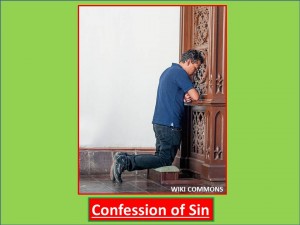CAT | The Power of God’s Word
23
Quotes That Keep The Church in Bondage: Pt 1
No comments · Posted by Peter Wilson in The Power of God's Word
Quotes That Keep The Church In Bondage!
Over the past 100 yrs the gospel has spawned a number of statements that people have latched onto. These statements or quotes have been picked up by people and passed around until they take on a life of their own and are taken as being Bible!
In my view these quotes, rather than setting people free, have kept them imprisoned in their sin and in bondage. I would like to challenge these quotes and replace them with what I consider to be Biblical truths. The first one is:
CONFESSION OF SIN
LK 18:13 GOD BE MERCIFUL TO ME A SINNER (NKJV)
This quote suggests that when a person comes to Christ, they have to confess their sins and ask God to forgive them. This formula has to be continued throughout a Christian’s life, hence whenever they sin, they have to confess it and ask for God’s forgiveness. But let’s look at what the scriptures teach – in the New Covenant there are only 3 instances of people confessing their sins:
1) John The Baptist: John came into the wilderness preaching that all people should repent of their sins. The people responded to his call: Mt 3:5,6 Then Jerusalem, all Judea, and all the region around the Jordan went out to him (John) and were baptised by him in the Jordan, confessing their sins. (NKJV)
John the Baptist was still under the Old Covenant and was preaching an Old Covenant message of repentance that demanded confession of sin!
2) The Pharisee and Tax Collector This is a parable of 2 men who went to the Temple to pray. The Tax Collector prayed thus: Lk 18:13 And the tax collector, standing afar off, would not so much as raise his eyes to heaven, but beat his breast, saying, ‘God, be merciful to me a sinner!’ (NKJV)
Again this story takes place under the Old Covenant.
3) The First Epistle of John The Apostle:
1 Jn 1:8,9 If we say that we have no sin, we deceive ourselves, and the truth is not in us. If we confess our sins, He is faithful and just to forgive us our sins and to cleanse us from all unrighteousness. (NKJV)
In my view, John is writing 1 Jn Ch1 to Gnostic’s who held to the believe that sin wasn’t real or didn’t matter.
The word ‘confess’ in v 9 could equally be translated as ‘acknowledge’. Hence John is telling the Gnostics that if they will acknowledge they are sinners, they can receive God’s forgiveness, but they are to acknowledge not confess their sins.
Let’s now look at 4 reasons why God under the New Covenant no longer asks us to confess our sin.
1) All our sin forgiven: At the cross Jesus as our High Priest, offered up Himself as a once for all sacrifice and took the punishment for ‘all’ our sins, past, present and future.
1 Jn 1:7 The blood of Jesus Christ His Son cleanses us from all sin. (NKJV) (Heb 9:28)
2) Sin Taken Away:
Jn 1:29 “Look! The Lamb of God who takes away the sin of the world”! (CEB) (Rom 11:27)
Jesus became our scapegoat who carried our sins away never to be brought back again.
3) Sin Not Remembered:
Heb 10:17“Their sins and their lawless deeds I will remember no more.” (NKJV) (Heb 8:12)
Jesus as our scapegoat took our sins away never to be brought back to our remembrance, and God Himself says He will remember our sins no more. The word ‘no’ is a double negative in the Greek, strengthening the denial.
It is God saying He will not, He will absolutely not, remember our sins any more.
4) Sin not counted against us.
2 Cor 5:19 God was reconciling the world to himself through Christ, by not counting people’s sins against them. (CEB) (Rom 4:8, 5:13)
At the cross then, God forgave the sin of the world, took it away and has forgotten it. For good measure, He now says He will no longer count it against us. Sin is gone forever.
Subsequently, whenever we sin, we are not to confess our sin, we are instead to receive His forgiveness which was freely given to us at the cross 2000 yrs ago.
Meditation Point: Ask yourself a question: If God forgave all my sin at the cross without asking anything of me in return except to receive His forgiveness – why am i spending all this time, energy and strength constantly confessing my sins?
No tags
When we confess our sin to God, we are forcing Him to forgive and remember something He forgave and forgot 2000 yrs ago.
Heb 8:10,12 This is the New Covenant I will make with my people on that day, says The Lord: I will forgive their wickedness, and I will never again remember their sins. (NLT)
No tags
8
Shoulda-Woulda-Coulda Pt 4
No comments · Posted by Peter Wilson in Shoulda-Woulda-Coulda, The Power of God's Word
SHOULDA – WOULDA – COULDA
In the final part of this series i want to look at those people who feel life is passing them by. They began their Christian life with joy, a passion for Jesus and a desire to proclaim the gospel of grace to a dying world.
Along the way however, they have raised a family, had problems, difficulties, ill health, or have retired from their employment; one or more of these things have left them exhausted, burnt out and hopeless.
They find themselves stuck in their relationship with God and have lost their passion, joy and zeal. They still have a heart for God but don’t know how to revive what they once had.
Let’s look at some key points of guidance:
Standing Before God : We must never ever forget that God does not judge us for our mistakes, sins or failures! He judged our sin on Calvary 2000 yrs ago, and now we are ‘In Christ’, He judges us as righteous (given right standing) which is justified or in simple speak, ‘just as if i have never sinned.’
So if we have been living under a cloud of guilt and condemnation, we need to come out from underneath it and embrace God’s forgiveness, acceptance and peace.
Rom 8:29-30 For God knew His people in advance, and having chosen them, He called them to come to Him. And having called them, He gave them right standing with Himself. And having given them right standing, He gave them his glory.
Feed On Christ : After Jesus had fed the 5000 on natural bread, He turned around and said to the people following Him,
”I am the bread of life. He who comes to Me shall never hunger.” (Jn 6:35 NKJV)
How do we come to Jesus and feed on Him who is the bread of life? We feed on Him by meditating on His Word. Jesus is the Word of God (Rev 19:13).
Many people have missed feeding on Christ because they read His word like any other book and seek to acquire head knowledge. ‘No, A thousand times No.’
The word of God is not a fast food read. I suggest taking 2 0r 3 verses and reading them very slowly, going back and reading them very slowly again, going back and reading them very slowly again. You will find a word or phrase will jump out at you and speak to you.
Stop any further reading. Take this phrase and turn it over again and again in your mind as if you are chewing and chewing your food (yes, like a cow chews cud). The Holy Spirit will open this word to you and give you understanding into it.
Ask God to bring these thoughts to your remembrance throughout the day and continue to chew on them. This is meditating and feeding on the word of God, and this new understanding will feed and strengthen your spirit and renew your mind which will in turn transform your life.
Changed From The Inside Out : Do not try to change yourself from the outside in. This is called, ‘Behaviour Modification.’ This will not change our heart and will lead to a religious and legalistic lifestyle resulting in defeat, failure and hopelessness. Many stronger than you and I have gone down this route and have had to retrace their steps back to a place of grace which changed them from the inside out.
The key thought in the word for ‘grace’ taken from Strong’s Greek Dictionary says:
GRACE : The divine influence upon the heart, and it’s reflection in the life.
The revelation that comes to us from feeding on the word of God is what will change our heart and give us righteousness, peace and joy.
Phil 2:12-13 Therefore, work out your own salvation with fear and trembling; for it is God who works in you both to will and to do for His good pleasure. (NKJV)
Meditation Point: He works in – I work out!
No tags
(READ RUTH CH’s 1-4)
Point 3: Sit Still My Daughter
When Ruth returns from collecting wheat in the fields, Naomi asks her which field she has been in.
Ruth 2:19 Then Ruth told her mother-in-law about the one at whose place she had been working. “The name of the man I worked with today is Boaz.” (NIV)
Naomi then proceeds to tell Ruth that Boaz is their Kinsman Redeemer. In Israel, when a married man died, the law said that his brother (his next of kin) was to marry and take care of his wife and children, pay off any debts that had incurred and bring them into his own family. This ensured that the land and property of the deceased man stayed in the family and tribe of his name.
If his brother was not able to do this, the nearest next of kin who was able took on this responsibility and redeemed (bought back from debt) this woman and her children.
Naomi then instructs Ruth what to do. She is to approach Boaz and say to him, “Spread the corner of your garment over me, since you are a kinsman-redeemer.” (Ru 3:9. NIV)
In Israel, when a man married a woman, he threw his outer garment over the head of his wife, thus publicly proclaiming he was now responsible for his wife and future family, to provide and take care of them.
Boaz responded to Ruth’s request by telling her that there was another next of kin closer than him, but if he wouldn’t marry her, Boaz would.
When Naomi hears Boaz’s response, she says to Ruth, “Sit still, my daughter, until you know how the matter will turn out; for the man will not rest until he has concluded the matter this day.” (Ru 3:18. NKJV)
Sure enough, Boaz goes through the process of contacting the man who is the nearest of kin to see if he wishes to redeem Naomi’s property and marry Ruth so as to keep them in the tribal territory. Eventually the man says he is not able to, leaving Boaz free to become the Kinsman Redeemer.
Boaz now purchases Naomi’s property and land and marries Ruth.
When we apply this principle to ourselves, we see that Boaz is a picture of Christ our heavenly Bridegroom and Ruth a picture of the Bride of Christ. Thus Christ as our Kinsmen Redeemer has thrown His garment over us, publicly proclaiming that He is responsible to protect, care and provide for us.
Hence, whenever we have a need, problem or difficulty we cannot resolve by our own means or strength, our response is to give it to our heavenly Boaz and like Ruth we are to sit still until He meets that need, resolves that problem, sorts out that difficulty.
Sitting in scripture speaks of rest. We are to give our needs to Jesus and rest in Him until He answers our prayer.
Sitting still speaks of inward rest, free from all anxiety, worry and fear; And Like Boaz, Jesus will not rest until He has resolved the matter.
Here’s the rub: when we rest – He works. When we work – He rests. Therefore if we give our problems to Jesus but take them back again and begin to worry – He stops working on our behalf and rests.
This is why Heb 4:11 says, “Let us labour (make every effort) therefore to enter into that rest.” (KJV)
This is an oxy-moron*. How can we work to enter His rest. The answer is that we have to work at giving and leaving our needs with Jesus by being focused on Him, putting our trust in Him and not on our need.
The Amplified Bible says, Heb 12:2 “Looking away from all that distracts.” As we continue to look away from our problem and look at Him, gaze upon Him and behold Him, our heart comes into rest, joy and peace.
Meditation Point: Matt 11:28-30. “Are you tired? Worn out? Burned out on religion? Come to me. Get away with me and you’ll recover your life. I’ll show you how to take a real rest. Walk with me and work with me — watch how I do it. Learn the unforced rhythms of grace. I won’t lay anything heavy or ill-fitting on you. Keep company with me and you’ll learn to live freely and lightly.” (THE MESSAGE)
* Oxy-moron: A figure of speech by which a locution produces an incongruous, seemingly self-contradictory effect, as in “cruel kindness” or “to make haste slowly.”
No tags






